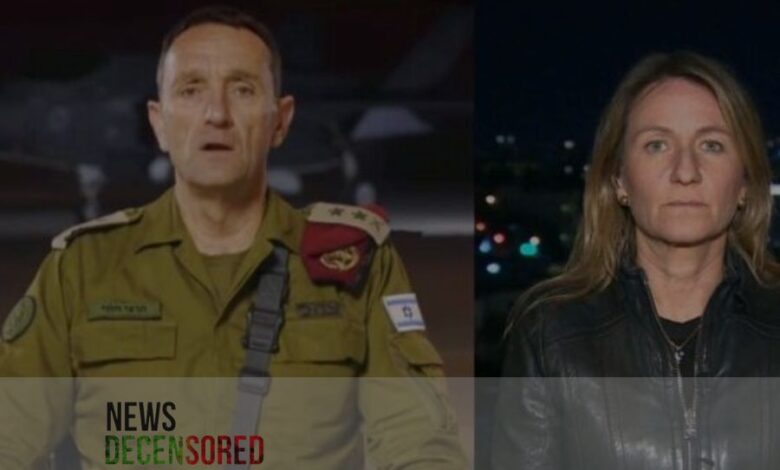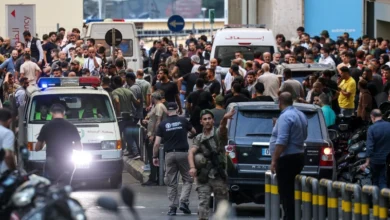Israel army chief pledges Iran response as Western countries urge restraint

The United States and its allies in Europe escalated their efforts to discourage Israel from retaliating against the Iranian attack, and US Secretary of Defense Lloyd Austin made contact with his counterparts in Europe and the Middle East to prevent the escalation of the conflict, amid Tel Aviv’s threat to respond to the unprecedented attack, and an Iranian pledge for a “stronger and harsher response.” For any retaliatory strike.
US Secretary of State Anthony Blinken and British Prime Minister Rishi Sunak said that Western countries are preparing to impose sanctions on Tehran, amid efforts to prevent the situation from escalating into an all-out war in the Middle East, according to the Financial Times.
Blinken indicated that Washington is coordinating a diplomatic response to seek to prevent escalation, while Sunak said that the “G7” is working on diplomatic measures against Iran, which is already subject to severe sanctions from the West.
White House National Security Council Strategic Communications Coordinator John Kirby confirmed on Monday that President Joe Biden “certainly does not seek war with Iran, and that Washington does not seek to expand and deepen the conflict in the region.”
The hectic diplomatic efforts came as Israeli Chief of Staff Herzi Halevy pledged to respond to the Iranian attack launched by Tehran with more than 300 missiles and drones. Halevy said that Tel Aviv is considering and weighing its next steps, stressing that “this attack, which witnessed many marches and cruise missiles on Israel, will be met with a response.”
The administration of US President Joe Biden and several other Western countries urge the government of Israeli Prime Minister Benjamin Netanyahu not to rush to take revenge on Iran, amid fears that this could lead to a regional war.
Biden said in a phone call with Netanyahu: “I have achieved victory,” warning that “the United States will not support any Israeli counterattack against Iran.”
Last Saturday, Iran launched an attack with hundreds of marches and missiles on Tel Aviv, in response to the Israeli attack on its embassy in Damascus on April 1, which claimed the life of a senior commander in the Iranian Revolutionary Guard, among 13 people killed in the attack, including 6 officers. Israel and its allies intercepted most of the marches and missiles, and Tel Aviv pledged a retaliatory response to the attack.
Extensive connections to Austin
The Pentagon said that Iran did not inform the United States in advance of its attack on Israel, and that Washington was not seeking a conflict with Tehran.
Austin held separate calls on Monday with the Crown Prince of Bahrain, Prime Minister Prince Salman bin Hamad Al Khalifa, Israeli Defense Minister Yoav Galant, German Defense Minister Boris Pistorius, and Qatari Minister of State for Defense Affairs Khalid bin Mohammed Al-Attiyah. The Pentagon reported that it condemned Iran’s attacks during those calls, and said that Washington was not seeking to escalate the conflict.
The Pentagon said Austin told his counterparts that “while the United States does not seek escalation, we will continue to defend Israel and American soldiers.”
The Pentagon added that during his call with Gallant, Austin expressed his support for defending Israel and “reaffirmed the strategic goal of regional stability.”
A Pentagon spokesman told reporters on Monday, “Whether Israel decides to respond to Iran or not is something for Israel to decide.”
An Israeli pledge to respond
General Halevy said during his visit to the Nevatim base in the south of the country that Israel “will respond to the launching of this very large number of missiles, cruise missiles and drones at Israel.” But the army stressed that “nothing will divert its focus on the war in Gaza.”
On Monday evening, Netanyahu chaired a war cabinet meeting to discuss possible responses, according to local media, with the issuance of the first Israeli comment on the bombing of the consulate in Damascus.
Israeli army spokesman Daniel Hajari said on Monday that those killed in the strike on the Iranian consulate in Damascus, which Tehran attributed to Israel, were “involved in terrorism against Israel,” in the first official Israeli comment on the April 1 attack.
In response to a question about the strike, Hajari told reporters, “As far as I know, those who fell in Damascus were members of the Quds Force. These are people who were involved in terrorism against the State of Israel,” adding, “Among these terrorist elements were members of Hezbollah and Iranian assistants.” “There was no diplomat there, as far as I know, and I am not aware of any civilians killed in this attack.”




